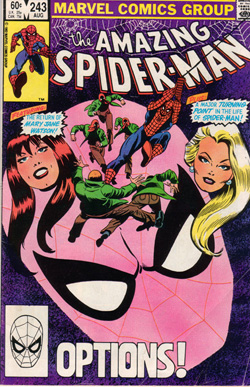 Peter Parker, like most of us, swings moods more often than he swings webs. He is the neurotic in all of us, without the caricature of neurosis that allows us to laugh unselfconsciously at Woody Allen and George Costanza. Like most of us, Peter worries about paying the rent, about getting the girl, and about the acuity of his moral sense: does he do good for its own sake, or to buoy his own sense of self-worth?
Peter Parker, like most of us, swings moods more often than he swings webs. He is the neurotic in all of us, without the caricature of neurosis that allows us to laugh unselfconsciously at Woody Allen and George Costanza. Like most of us, Peter worries about paying the rent, about getting the girl, and about the acuity of his moral sense: does he do good for its own sake, or to buoy his own sense of self-worth?Pete’s neuroses sometimes get the better of him; at certain moments of his career, they have crippled him physically, robbing him of his ability to stick to walls and lift car-weight loads over his head. But he always returns to the antidote of humour: he can make a crack about Doc Ock’s bowl-cut at the same time he’s stopping the villain from destroying New York City. In the darkest moments, he lightens the mood by sheer force of will. Peter’s ability to overcome the big and little troubles of life makes him heroic, in a way that makes the “super” prefix almost superfluous.
(Note: I wrote up this meditation on Spider-Man for submission to the "In Character" blog on NPR.com. It doesn't include a direct quotation as these entries normally do, and so I hope you'll forgive me for this rare contravention of the blog rules.)